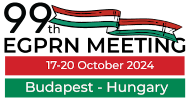Perspectives and Experiences of Healthcare Providers and Research Coordinators in Scientific Study Participation: A Qualitative Descriptive study
Gianni Wijnants, Sophie Van Hoof, Lieve Peremans
Background:
Scientific research in healthcare covers various areas, from primary to specialized hospital settings, focusing on healthcare professionals and patients as units of analysis. Health workers often face obstacles such as heavy workloads and time constraints which limits their own involvements in research. Recruiting an adequate number of healthcare providers poses a challenge, thereby influencing the sample size and impeding the research process. This qualitative descriptive study aims to elaborate on the experiences of healthcare providers in scientific research and master’s theses, providing insights to enhance future research initiatives.
Research questions:
How do healthcare providers and research coordinators in primary and secondary care experience participation in scientific studies?
Method:
This descriptive qualitative study, used semi-structured interviews to gather information among health care providers and research coordinators. The subjects were qualified Dutch speaking health care providers working in primary and secondary care and involved in participating in research. There were 19 interviewees between February and April 2024, with each interview lasting 33 minutes on average. Data analysis was thematically done using an inductive method.
Results:
The intrinsic motivation and professional context of healthcare providers influenced their readiness for research, due to factors like knowledge, experience, personal satisfaction, time commitment, compensation, relationships with researchers and the subject. Trustful relationships facilitated recruitment through clear personalized communication about relevant research objectives. Research findings improving health of patients and direct dissemination into practice were crucial for participation. Supporting collaboration between researchers and practice as well as a bottom-up research designs were critical for successful involvement and practical relevance. Recruitment strategies which involved personalized approaches and adequate information were more effective.
Conclusions:
This study identifies multiple factors that influence healthcare providers' experiences with research participation, which could be valuable for consideration in future recruitment and execution of research. This study underscores the necessity for further research into healthcare providers' participation in research.
Points for discussion:
What kind of barriers do you experience in the recruitment of patients and health care providers in research?
Which solution are working in your context?
#24

